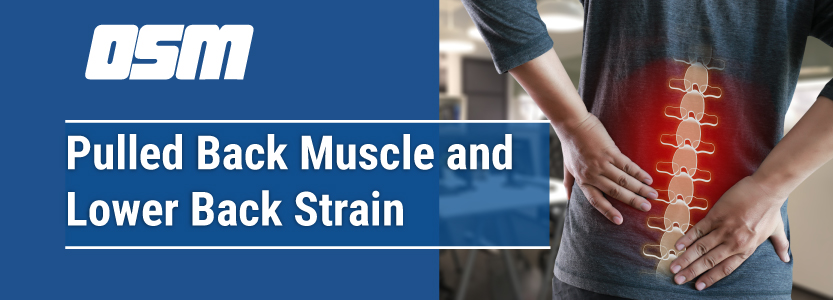Pulled Back Muscle and Lower Back Strain
Article featured on Spine-health
Most episodes of low back pain are caused by damage to the soft tissues supporting the lower spine, including muscles, tendons, and ligaments.
The lower spine, also called the lumbar spine, depends on these soft tissues to help hold the body upright and support weight from the upper body. If put under too much stress, the low back muscles| or soft tissues can become injured and painful.
While a pulled back muscle or strain may seem like a minor injury, the resulting pain and muscle spasms can be surprisingly severe.
Types of Lower Back Strain
There are two common types of soft tissue injuries in the low back:
- Muscle strain occurs when fibers in a muscle begin to tear from being overstretched or overused (commonly called a pulled muscle).
- Lumbar sprain occurs when ligaments are overstretched or torn. Ligaments are tough, fibrous tissues that connect bones together.
A specific diagnosis of ligament sprain or muscle strain is usually not needed, as both have almost identical symptoms and receive the same treatment. This article refers mainly to lower back muscle strains, but applies to sprains or other soft tissues injuries as well.
Inflammation and Muscle Spasm
When soft tissues in the low back are stretched or torn, the surrounding area will typically become inflamed.
Inflammation, or local swelling, is part of the body’s natural response to injury, in which blood is rushed to an injured tissue in order to restore it. Inflamed muscles may spasm, feel tender to the touch, or cramp , and contract tightly, causing intense pain.
The Course of Lower Back Muscle Strain
The hip, pelvis, buttock, and hamstring muscles assist low back muscles in supporting the lumbar spine. When these muscles are injured, pain or tightness may be felt across the low back and into the hips or buttocks.
Symptoms are typically limited in duration and follow a pattern:
- Pain is most intense for the initial few hours and days. It is normal to experience increased pain with certain movements or positions, such as bending forward, backward, or standing upright.
- Ongoing moderate pain and stiffness is usually felt for 1 to 2 weeks while muscles heal. Pain when holding certain movements (such as anything that jars the spine) or positions (such as standing for a long period), stiffness, and local tenderness are typical.
Compared to many other kinds of back injuries, a pulled muscle is usually straightforward to diagnose and easy to treat, and symptoms usually resolve within 4 to 6 weeks. Some severe muscle injuries, such as a complete muscle tear, can take months to heal.
The Orthopedic & Sports Medicine Center of Oregon is an award-winning, board-certified orthopedic group located in downtown Portland Oregon. We utilize both surgical and nonsurgical means to treat musculoskeletal trauma, spine diseases, sports injuries, degenerative diseases, infections, tumors and congenital disorders.
Our mission is to return our patients back to pain-free mobility and full strength as quickly and painlessly as possible using both surgical and non-surgical orthopedic procedures.
Our expert physicians provide leading-edge, comprehensive care in the diagnosis and treatment of orthopedic conditions, including total joint replacement and sports medicine. We apply the latest state-of-the-art techniques in order to return our patients to their active lifestyle.
If you’re looking for compassionate, expert orthopedic surgeons in Portland Oregon, contact OSM today.
Phone:
503-224-8399
Address
17355 Lower Boones Ferry Rd Suite 100A
Lake Oswego, OR 97035
Hours
Monday–Friday
8:00am – 4:30pm



